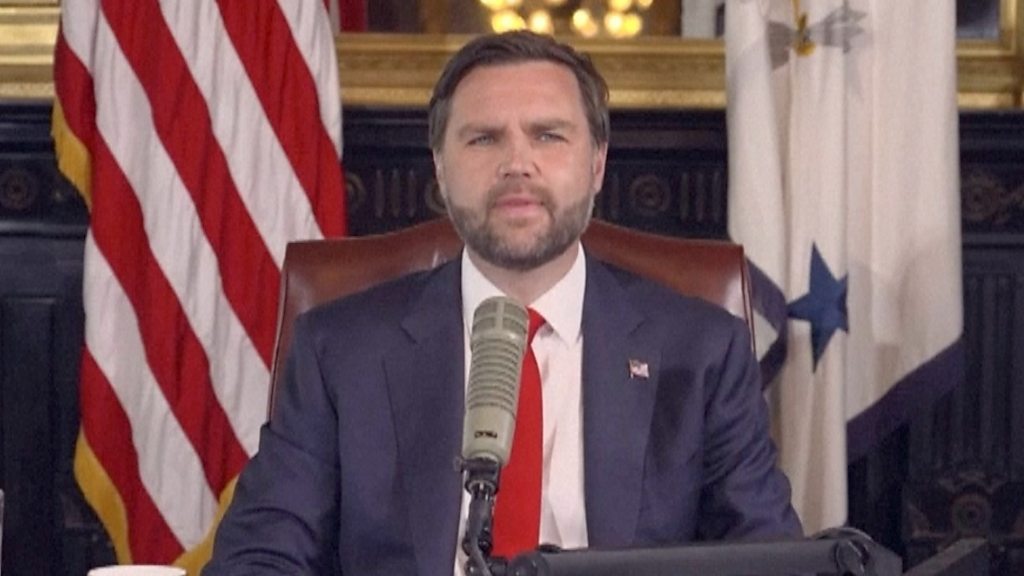The political atmosphere in the United States has been increasingly defined by polarization, outrage, and moral battles waged in both traditional and digital spaces. In the latest development, Senator J.D. Vance has entered the fray with a striking call for employers to take action against workers who publicly celebrate the death of conservative activist Charlie Kirk.
- The Context Behind Vance’s Call
- Charlie Kirk’s Role in American Politics
- The Ethics of Celebrating Death in Politics
- Free Speech Versus Professional Consequences
- The Role of Social Media in Amplifying Outrage
- Political Exploitation of Cultural Flashpoints
- Employer Responsibilities and Challenges
- Broader Implications for American Society
- FAQs
- Why did J.D. Vance urge employers to act against those celebrating Charlie Kirk’s death?
- Does the First Amendment protect people from being fired for celebrating Kirk’s death online?
- What role did Charlie Kirk play in American politics?
- How does social media affect controversies like this?
- What challenges do employers face in situations like this?
- Conclusion
His statement has ignited intense debate, raising questions about free speech, workplace ethics, and the boundaries of political expression in an age where social media serves as both a megaphone and a minefield. Vance’s demand has put employers, employees, and the broader public at the center of a cultural conflict that reveals just how intertwined personal beliefs and professional consequences have become.
Charlie Kirk, the founder of Turning Point USA, was a polarizing figure in American politics. Loved by his supporters for his uncompromising conservatism and criticized by detractors for his confrontational style, his sudden death left both shockwaves and heated emotions across the political spectrum. Social media platforms quickly became venues for both mourning and hostility.
The Context Behind Vance’s Call
Senator J.D. Vance, a prominent Republican voice and a close ally of former President Donald Trump, has often used cultural controversies as a political springboard. His call for employers to penalize those rejoicing over Kirk’s death taps into an ongoing conservative narrative that portrays American institutions as increasingly hostile to traditional values. For Vance, this is not just about decency but about reinforcing consequences for what he deems “unacceptable public behavior.”
In a post that quickly went viral, Vance argued that celebrations of death cross moral boundaries and reflect poorly on individuals’ ability to work in professional environments. He suggested that companies should not tolerate employees who publicly display such behavior, comparing it to other forms of misconduct that would lead to disciplinary action. His words resonated strongly with conservative audiences but also drew sharp criticism from advocates of free speech, who argued that political opinions—even when harsh—should not serve as grounds for termination.
The broader backdrop is America’s history of debates over the limits of free expression. From workplace codes of conduct to viral social media scandals, the balance between what an individual says and how it impacts their career has always been precarious. Vance’s statement thrusts this tension back into the spotlight, raising the stakes by tying it directly to one of the most contentious figures in recent conservative activism.
Charlie Kirk’s Role in American Politics
To understand why Vance’s remarks carry such weight, one must consider Charlie Kirk’s significance. As the founder of Turning Point USA, Kirk cultivated one of the most influential conservative youth movements in the country. His organization championed free markets, limited government, and cultural conservatism, while also embracing fiery opposition to progressive causes.
Kirk became a fixture on college campuses, where his events often sparked protests and heated debates. He also enjoyed a strong presence in media, frequently appearing on television, podcasts, and rallies. For conservatives, he symbolized the fight against what they perceived as left-wing indoctrination in academia and culture. For progressives, however, he epitomized combative right-wing rhetoric that fueled division.
The polarizing nature of his activism explains why his passing provoked such extreme reactions. Supporters mourned him as a patriot whose voice had been silenced, while critics saw his death as an end to what they considered harmful political influence. The eruption of celebratory posts online, though distasteful to many, was hardly surprising in today’s climate of bitter partisanship.
The Ethics of Celebrating Death in Politics
At the heart of this controversy lies a profound ethical question: should death ever be celebrated, even when it concerns a political opponent? History shows that strong reactions to the death of polarizing figures are not new. When leaders, activists, or controversial public figures pass away, the responses often reveal more about societal divisions than about the individuals themselves.
Critics of the celebratory responses argue that rejoicing in death dehumanizes opponents and corrodes the moral fabric of political discourse. It reduces politics to a battlefield where empathy and basic respect are discarded. Proponents, however, argue that public figures wield influence that shapes policies and lives, and thus, their legacy and demise carry real-world consequences worth acknowledging—even if through dark expressions of relief or mockery.
Vance’s position attempts to frame such celebrations as not just immoral but professionally unacceptable. Yet this raises further dilemmas. Should morality dictate employment? Should employers act as arbiters of personal expression, particularly when that expression takes place on private social media accounts outside of work hours? These questions strike at the intersection of ethics, law, and workplace governance, leaving no easy answers.
Free Speech Versus Professional Consequences
The First Amendment protects Americans from government censorship, but it does not shield individuals from consequences imposed by private employers. This distinction has fueled countless controversies in the digital age. From viral tweets to controversial Facebook posts, employees across industries have found themselves facing termination when their public remarks clash with company values.
Supporters of Vance’s call argue that employers have a responsibility to uphold standards of decency, and that workers who publicly celebrate death damage a company’s reputation. They point to corporate codes of conduct that already penalize employees for online harassment or hate speech. Opponents counter that this sets a dangerous precedent, one where political opinions—even extreme or offensive ones—become grounds for dismissal, chilling free expression in society.
The debate also highlights inconsistencies. Would the same standards apply across the political spectrum? For example, if a progressive employee celebrated the death of a conservative figure, would consequences be equally enforced as if a conservative did the same regarding a liberal figure? Critics worry that selective enforcement would deepen perceptions of political bias in workplaces.
The Role of Social Media in Amplifying Outrage
Much of this controversy is inseparable from the role of social media platforms. In a pre-digital age, private opinions about the death of a political figure would remain confined to personal conversations. Today, however, platforms like Twitter, Facebook, and TikTok magnify these sentiments, making them visible to millions within seconds.
This visibility not only fuels outrage but also creates permanent digital records. Employers increasingly monitor online activity, often using it as a reflection of an individual’s character and judgment. The virality of celebratory posts about Kirk’s death underscores how quickly personal expression can transform into public scandal.
Experts in digital ethics argue that social media has collapsed the boundary between public and private selves. What once could be considered personal is now inherently performative. In this environment, the line between freedom of speech and professional accountability becomes increasingly blurred.
Political Exploitation of Cultural Flashpoints
Senator Vance’s intervention is not just about morality but also about political strategy. By highlighting the issue, he taps into conservative concerns that American culture is increasingly permissive of hostility toward right-wing figures. His framing positions conservatives as victims of moral hypocrisy, suggesting that society tolerates attacks against them while silencing dissent in the opposite direction.
This strategy is familiar. Culture wars thrive on outrage, and politicians across the spectrum leverage moments of public anger to galvanize their bases. In this case, Vance’s stance serves both as a moral declaration and a political weapon, reinforcing his brand as a defender of conservative values while simultaneously inflaming debate across ideological lines.
Employer Responsibilities and Challenges
Employers now face difficult decisions. On one hand, allowing employees to publicly celebrate a death could tarnish a company’s image, potentially alienating customers or business partners. On the other hand, disciplining employees for personal political speech risks accusations of bias and legal challenges.
Human resources experts note that while companies have leeway in setting conduct standards, they must ensure consistent enforcement. Selective punishment based on political alignment could expose businesses to reputational damage or even lawsuits. Furthermore, a heavy-handed approach could harm workplace morale, as employees may fear that private opinions could cost them their jobs.
In many cases, companies may seek middle ground through employee guidelines emphasizing professionalism online. Training on digital conduct, reminders about public visibility, and clear communication of company values may serve as preventative measures without resorting to dismissals.
Broader Implications for American Society
The debate over Vance’s call touches on larger questions about America’s cultural trajectory. Are we moving toward a society where political enemies are treated as irredeemable foes, even in death? Or can there still be space for empathy and respect amid profound disagreement?
Moreover, this controversy underscores how politics increasingly infiltrates every aspect of life. From workplaces to social gatherings, partisan divides shape perceptions of morality, professionalism, and even humanity. The death of Charlie Kirk—and the reactions it provoked—becomes a mirror reflecting the intensity of these divides.
FAQs
Why did J.D. Vance urge employers to act against those celebrating Charlie Kirk’s death?
Vance argued that celebrating death crosses moral boundaries and reflects poorly on individuals’ character. He urged employers to hold such employees accountable, comparing their behavior to other forms of misconduct that companies would not tolerate.
Does the First Amendment protect people from being fired for celebrating Kirk’s death online?
No. The First Amendment protects individuals from government censorship but does not prevent private employers from disciplining or terminating employees based on their public statements, particularly if they harm the company’s reputation.
What role did Charlie Kirk play in American politics?
Charlie Kirk was the founder of Turning Point USA and a major figure in conservative youth activism. He championed right-wing causes, frequently appeared in media, and was both celebrated by supporters and criticized by opponents for his combative style.
How does social media affect controversies like this?
Social media amplifies outrage by making private opinions instantly public and widely visible. Posts that might once have been personal conversations are now broadcast to millions, creating both reputational risks and heightened political conflict.
What challenges do employers face in situations like this?
Employers must balance protecting their reputations with respecting employees’ rights to personal expression. Inconsistent enforcement of rules can lead to accusations of bias, while heavy-handed punishment can create fear and resentment within workplaces.
Conclusion
Senator J.D. Vance’s call for employers to act against those celebrating Charlie Kirk’s death represents more than a momentary controversy. It reveals the growing entanglement of politics, morality, and professional life in a society deeply divided along ideological lines. Kirk’s death became a flashpoint not only for grief and anger but also for profound questions about decency, free speech, and the responsibilities of both individuals and institutions.
The issue forces Americans to grapple with difficult realities: how much freedom of expression should extend into professional life, whether morality can or should be policed in the workplace, and what it means for a democracy when political divisions grow so intense that even death becomes a cause for celebration or condemnation. In a nation already strained by polarization, Vance’s remarks serve as both a warning and a reflection—showing just how fragile the balance between freedom and accountability has become in the digital era.





